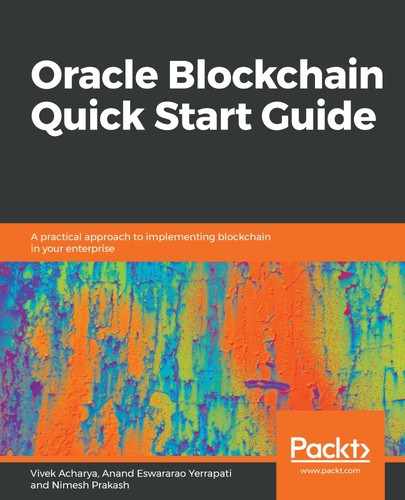To keep it simple, BaaS solves cost, efficiency, and transparency challenges. It allows the business to explore, experiment, experience, and then engage in blockchain. It takes away the intricacies of implementation and allows the business to focus on the core. It's analogous to an aged whiskey. You can trust its manufacturer and pay for it to enjoy it. You do not need to get into the details of where it was manufactured, under what conditions, how it was treated, and so on. Blockchain enables product provenance.
There is an explosion of ideas around use cases, which can be advantageous for DLT, and blockchain and BaaS will drive the wave in the adoption of DLT and blockchain, thereby realizing and fulfilling these ideas for enterprises, customers, and entrepreneurs. There are various use cases that can be addressed by leveraging BaaS:
- Prowess (education and profession): A ledger of prowess can act as a single source of truth for certificates, assessments, skills, and so on. It offers prowess ownership, full authority on the asset (certificate, transcripts, skills, evidence, and so on), and offers a solution to fully track and trace an individual's certificates, skills, and knowledge. There are various use cases beyond certificates. For example, while hiring someone, organizations need authentic and trustworthy information about the credentials of an applicant. A ledger of prowess will offer the ledger that holds the applicant's certificates, skills, experience, expertise, and other relevant reports, immutably. In addition, as these records are immutable, even the applicants cannot fabricate it to meet specific job requirements. We easily calculate the risk involved in hiring an applicant who has fabricated his/her skills.
- Supply chain: A ledger of supply can act as a single source of truth for asset management, procurement, product life cycle management, logistics, provenance, fraud detection, and so on. It can go beyond the provenance (tracking of products) to a full life cycle of SCM on blockchain.
- Government: Government agencies hold citizen data and various other kinds of sensitive information. The sensitivity quotient poses security and privacy risks. Blockchain's public repository, along with hashing, cryptography, and other proven technologies, can take care of hacking, data modifications, loss of information, and so on. A ledger of trust can take care of citizen rights, votes, donations, and so on. A voting platform with ledger of trust can ensure fraud-free voting and fraud-free counting, and check vote rigging. Results are quick and the entire exercise of executing elections can be made cost-effective, timely, and trustworthy. A ledger of unique identity (UID) can digitize secure identity management.
- Real estate: A ledger of ownership can act as a truth for the ownership of properties, ease the listing of properties, allow the transferral of ownership in minutes, reduce the cost of listing properties, and so on.
- Healthcare: A ledger of wellness can evolve as a truth to track patient and doctor information. This will take care of drug counterfeits, secured and controlled exchange of information such as prescriptions and medical history, and so on. The current system stores medical information in silos with massive restrictions on sharing and its usage. A ledger of wellness will lead to storing information on an immutable and secure ledger, where discrete stakeholders have access to it based on their privileges. Blockchain and its chaincode can automatically keep audit and track an individual's health and history, and can even allow patients to monetize their medical records for research, which is a huge gain for humanity.
- Insurance: A ledger of assurance can be a source of truth from policy sales to settlement, which includes sale of a policy, maintenance of a policy (renewals, terminations, adjustments, and so on), claims, evaluation and evidence, and settlements. This will eliminate cumbersome processes, reduce third-party involvement, allow for faster settlements, and so on.
- Intellectual properties: A ledger of IP can be a proven source for patents and trademarking of IP; it reduces IP abuse, ensures IP owners receive credits and monetary benefits for their IP, and so on.
- Fintech: A ledger of affluence can be the base for cross-broader payments and faster B2B transactions. It eliminates reconciliations, infuses trust among traders, and so on. It can also be used for clearing and settlements, trade finance, KYC, and AML.
- Other industries: These can use BaaS as well, and they are as follows:
- Travel: It can be used for passenger processing, travel trace and tracking, single source of truth for passenger identity, and so on. With critical documents being on the ledger, passport forging, pass-through, illegal immigration, and so on can be checked.
- Humanitarianism: It can be used for charity, donations, and so on.
- Transportation: The use cases include track, trace, and so on.
- Oil and gas: It can be used for freight management, payments, shipments, and so on.
- Analytics: I'm pushing analytics as a horizontal industry here, as I believe in the quote: Where there is data, there is analytics (Vivek Acharya). Referring to the aforementioned example on Healthcare—patients trying to monetize their medical records also serves humanity a lot. If that happens, it needs an efficient analytics platform to make sense of the blockchain data. Other than that, transactional data on ledgers can lead to greater insights. Blockchain, along with AI, can lead to better forecasting, effective predications, and answers to business and end-users questions in real time.
